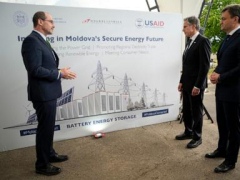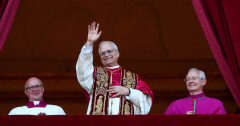CHISINAU, Moldova — President Donald Trump’s abrupt freeze of U.S. foreign aid is sending shockwaves through Eastern Europe, leaving pro-democracy groups, independent media, civil society initiatives and local governments scrambling to make ends meet in a region often defined by rivalries between East and West.
The U.S. State Department said that the 90-day freeze aims to root out waste and block so-called woke programs to expose U.S.-funded activities “that run contrary to our national interests” — as Trump aggressively rolls out his “America First” agenda.
Eastern Europe has been a longtime geopolitical battleground where Western foreign policy interests often collide with those of Moscow or Beijing.
Many fear the cessation of U.S. funds could expose Washington’s allies — and create a vacuum that its foes could gladly seek to fill.
“In Moldova’s case, foreign donor support is vital to balancing the media landscape,” says Oxana Greadcenco, the director of independent media platform Moldova.org. “Many television networks and media institutions are funded by Russia so there needs to be a counterbalance … This is an unprecedented situation, but we are trying not to panic.”
The U.S. Agency for International Development, or USAID, informed her that grants officially ended on Jan. 24 and they aren’t allowed to spend any remaining funds in their accounts. This week, Greadcenco promoted their online Patreon campaign, which garnered 135 new backers in two days, which should cover salaries for the platform’s 16-strong staff through March, she said.
“We did not expect it to impact Moldova so severely, as we thought there would only be a partial cut in funds,” she told The Associated Press. “Being aware of how much Moldova depends on U.S. funds, not just NGOs and the press but also local municipalities, many public institutions … this is a shock for everyone.”
Since the 1990s, USAID has invested several billion dollars in countries like Moldova, Serbia, Albania, Kosovo, and Bosnia and Herzegovina — all former communist countries with aspirations of joining the European Union.
In these countries, USAID money has promoted democratic institutions and reforms, aided infrastructure and energy security projects, bolstered businesses and economies, and supported a significant number of nongovernmental organizations and independent media platforms. The agency says it “tailors its approach to each country’s unique challenges and opportunities.”
“It’s no exaggeration to say that we have democracy in Moldova, in part thanks to American financial support,” Valeriu Pasa, the chairman of the Chisinau-based think-tank WatchDog, said in a statement on Wednesday. He added that the U.S. benefits “from us being more democratic and developed, ensuring we don’t turn into a Russian or Chine





